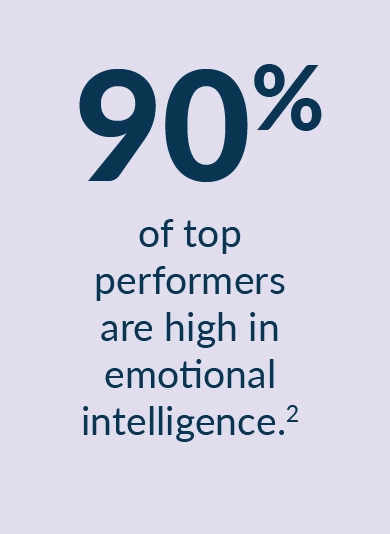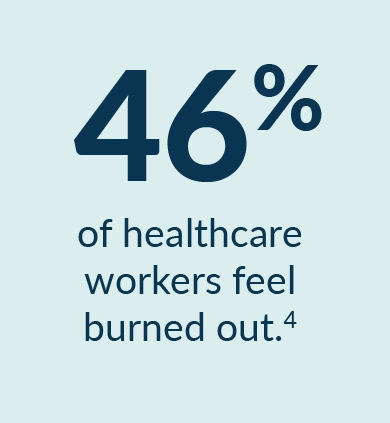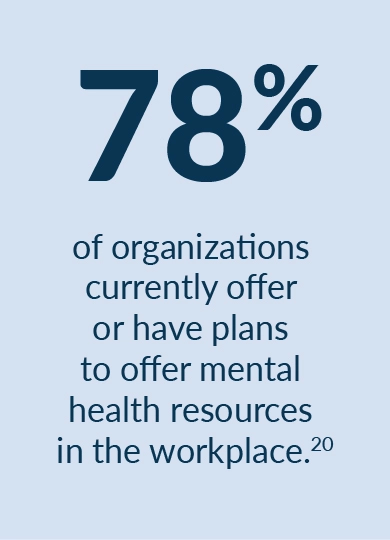Why Emotional Intelligence is Important in Healthcare

Benefits of Emotionally Intelligent Healthcare Workers & How to Improve This Skill in Your Staff
When hiring new healthcare workers or considering current employees for promotion, you likely look at their education, experience, and hard and soft skills relevant to the position. Another factor to think about is their emotional intelligence, which not only impacts the worker’s job performance but can even affect the healthcare system as a whole.1


What Is Emotional Intelligence?
Emotional intelligence, sometimes referred to as EI or EQ (for emotional quotient), refers to a person’s ability to perceive, understand, express, and manage their own emotions, in addition to being able to identify and manage emotions in others. The U.S. Office of Personnel Management defines this form of intelligence as “a type of social competence” that involves five basic skills or abilities:3
- Self-awareness of one’s emotions and feelings as they occur
- Managing one’s own emotions or self-regulating emotions appropriately
- Motivating oneself with emotions; using emotions to achieve a goal
- Having empathy and sensitivity for other people’s emotions
- Handling relationships or using social skills to manage others’ emotions
Why Emotional Intelligence Matters in Healthcare
Healthcare workers benefit from developing their emotional intelligence in a variety of ways. Here are several to consider.
Promotes Optimal Mental Health


Healthcare workers have a high risk of experiencing mental health issues. This is due to a variety of factors, from regularly being exposed to human suffering to work-related hardships such as long days, unpredictable and irregular schedules, and sometimes demanding physical job duties (such as when helping patients move from a bed to a chair).
The National Institute for Occupational Safety and Health (NIOSH) reports that nearly one in four health workers (22%) experience moderate levels of depression, anxiety, and post-traumatic stress disorder. Additionally, nursing staff, frontline workers, and younger workers have the highest risk of developing more severe mental health symptoms according to the NIOSH.
Providing access to emotional intelligence training programs can help promote optimal mental health in workers, and research supports this. For instance, one longitudinal study found that when individuals received EI training, they had lower rates of depression, suicidal ideation, and anxiety than those in a sham training program.7
Improves Communication
Having strong communication skills is critical in healthcare. Whether communicating a patient’s health status to the rest of the team or providing the patient with diagnosis, testing, or treatment instructions, this information must be both given and received with accuracy. Emotional intelligence supports effective communication by enhancing these skills.8
Building emotional intelligence is considered foundational to good communication, with one writer explaining, “Simply put, you cannot communicate effectively with others until you can assess and understand your own feelings.”9 Additionally, understanding the emotions of others can help foster empathy in healthcare practitioners, which has been found to improve patient outcomes.10
Enhances Teamwork
Some refer to healthcare as “a team sport.”11 Like in team sports, workers in healthcare settings often combine efforts to achieve a common goal. Everyone’s strengths can also be utilized in a way to make the entire team stronger or more effective. What enhances this type of teamwork? Emotional intelligence.
When workers are emotionally intelligent, they’re more understanding with team members and better able to recognize the emotions underlying other members’ behaviors.8 EI also helps promote teamwork in another way, by aiding in conflict management.
Strengthens Conflict Management Skills
Research reveals that conflict management is one of the most common challenges facing healthcare teams today.12 Two types of conflict that one may be called on to manage are:
- Relationship conflict, or conflict that arises when people have different personalities, values, and beliefs
- Task conflict, which includes differences in the way people approach tasks or disagreements about ideas or opinions
Either way, finding ways to resolve conflict peacefully and with respect can help contribute to a more cohesive team. Developing workers’ emotional intelligence can assist with this because emotionally intelligent people are often able to better manage conflict.8
Supports Effective Decision-Making
Healthcare workers can be faced with numerous decisions in a given day. Unlike in some other professions, these decisions sometimes have major consequences, so they require careful evaluation – a key component of good decision-making skills.13
EI training can assist with this because, when workers are emotionally intelligent, they are less likely to act impulsively.8 They take the time to think objectively about the situation, enabling them to consider the data needed to make more effective decisions.
Enables Workers to Handle Emotionally Charged Situations
When working in healthcare, professionals sometimes face tough emotional situations. Patients may be struggling to come to terms with a new diagnosis or feel scared after receiving an unfavorable prognosis. This can be emotionally taxing for these professionals, which is where EI comes into play.
Research published in Frontiers in Sociology suggests that developing emotional intelligence can help healthcare workers “tackle exceptionally difficult situations.”14 The author shares that EI enables workers to better regulate patient boundaries, positions them to evoke feelings of calmness and acceptance in others, and refuels their energy levels – all of which raise their level of excellence as healthcare professionals.
Contributes to a More Effective Leadership Style
A study published in Nursing Management assessed the impact of emotional intelligence training on nurse managers within a healthcare system operating in the Southeastern U.S. After analyzing the results, researchers connected higher emotional intelligence in this group with a transformational leadership style, which is considered more effective than other leadership approaches.15
This study’s authors go on to say that EI can help nurse managers stay calm when faced with challenges, thereby reducing discontent in their staff and helping reinforce a positive work culture. They add that being strong in emotional intelligence can also help nurse managers better motivate and influence employees while “nurturing a culture of innovation and change.”15
Measuring Healthcare Workers’ Emotional Intelligence
Here’s the good news: healthcare workers often have higher EI than the average population. A review of 321 studies including 112,691 participants looked at health professionals’ emotional intelligence and determined that while these levels varied, all professions analyzed – which included nursing assistants and numerous allied health positions – had average or above-average EI scores.16
The U.S. Office of Personnel Management states that a common way employers measure EI is by administering a questionnaire.3 Some EI tests require the person taking them to consider emotional scenarios and how they’d respond. Others involve providing an emotional problem and asking how the person would solve it. Still others ask the test-taker questions designed to assess their emotional awareness and regulation skills, and then provide a score based on the answers.
Some of the best EI tests in terms of consistency, validity, and reliability include:17
- Workgroup Emotional Intelligence Profile-3 (WEIP-3)
- Multidimensional Emotional Intelligence Assessment (MEIA)
- Schutte Self Report-Inventory (SSRI)
- Mayer-Solovey-Carus Emotional Intelligence Test 2.0 (MSCEIT 2.0)
- Wong and Law’s Emotional Intelligence Scale (WLEIS)
Several companies offer these tests online. Depending on your location, you may also be able to find a local agency that offers EI testing services.
Ways to Boost Emotional Intelligence in Healthcare Workers
Research suggests that a person’s level of emotional intelligence is influenced by their parent’s EI levels, especially that of their mother.18 However, other studies reinforce that this skill or ability can also be learned.19 Here are a few strategies for promoting emotional intelligence in healthcare workers.
Offer Mental Health Resources
Since emotional intelligence and mental health are connected, providing employees access to mental health programs and resources may help them develop their EI skills.


The American Psychiatric Association Foundation’s Center for Workplace Mental Health offers Frontline Connect, a resource for healthcare leaders to improve care access for frontline workers. Mental Health America also offers a free downloadable Mental Health Month Toolkit that healthcare organizations can utilize to learn more about free resources and gain access to a variety of DIY tools, templates, and printable handouts.
Offering access to mental health resources might provide additional benefits as well. The Society for Human Resources Management (SHRM) reports that 86% of HR professionals believe this one action alone can improve worker retention, with 72% feeling that it can also help attract new talent.20
Provide Communication Skills Training
After completing a communication skills workshop in one research study, healthcare students and trainees reported greater comfort, awareness, and preparedness for using emotional intelligence to advance and encourage their interprofessional teams.21 This suggests that communication skills training helps promote EI in healthcare settings.
Other research shares additional benefits of advancing communication skills in healthcare workers. These benefits include promoting a positive professional-patient relationship, helping to improve the patient’s health and even their quality of life, and improving the worker’s performance and self-efficacy.22
When implementing this type of training, consider strategies to build workers’ verbal, nonverbal, and written communication skills. This provides them with the ability to work on their communication across each of these mediums, all of which are used in healthcare settings. The Cleveland Clinic adds that working on active listening skills is also important.23
Promote Mindfulness Meditation
Mindfulness meditation is a practice that involves keeping one’s awareness in the present moment. They might do this by focusing on their breath, noticing their thoughts, or paying attention to how they feel. Some use mindfulness meditation to increase their awareness of bodily sensations, such as where it may ache, areas of tightness, or any other physical sensations.
A 2021 review of 10 studies revealed two connections between mindfulness and emotional intelligence in healthcare professionals and students.24 The first was that as mindfulness increased in these individuals, so did their emotional intelligence. More specifically, mindfulness improved their ability to perceive, express, and regulate their emotions. Authors noted that this can positively impact their quality of patient care, also increasing their empathy and resilience.
The second connection noted in the review was that as mindfulness increased, the healthcare workers’ and students’ feelings of emotional exhaustion decreased. This is critical for those in the healthcare field as, for this demographic, emotional exhaustion is associated with an increased risk of:25
- Depression
- Substance abuse
- Suicidal ideation
- Medical errors
- Suboptimal patient care
There are numerous ways to engage in mindfulness meditation. One is simply to sit for a few minutes and pay attention to your body and how it feels or focus on your breaths. Being mindful of your surroundings when walking, eating, or engaging in any other activity can also increase one’s awareness of the present.
Promoting mindfulness in healthcare staff can be as simple as sending regular text or email messages during their shifts to remind them to be present in the here and now. Healthcare organizations can also provide a list of ways to engage in this practice, whether through a local mindfulness teacher or even an app. Another option is to provide them with direct access to a mindfulness meditation program.
Implementing Healthcare Workforce Training
Providing healthcare employees with access to training can provide advantages to them personally and professionally, in addition to bringing benefits to healthcare organizations.
If you’re interested in healthcare workforce training, Nasium Training offers a variety of solutions for upskilling and reskilling your workforce. Each training program can be customized to fit your skills gaps, desired outcomes, and worker needs, providing a more personalized solution.
Contact us today to discuss how we can help you develop the skills your workforce needs to excel in their current roles or prepare for other healthcare positions. Simply tell us about your pain points or what you’d like to accomplish, and we’ll work together to find the best solution for you.
1 Carminati L. Emotions, Emotion Management and Emotional Intelligence in the Workplace: Healthcare Professionals’ Experience in Emotionally-Charged Situations. Front Sociol. https://www.frontiersin.org/articles/10.3389/fsoc.2021.640384/full
2 TalentSmartEQ. https://www.talentsmarteq.com/
3 U.S. Office of Personnel Management. Emotional Intelligence Tests. https://www.opm.gov/policy-data-oversight/assessment-and-selection/other-assessment-methods/emotional-intelligence-tests/
4 Centers for Disease Control and Prevention. Health Workers Face a Mental Health Crisis. https://www.cdc.gov/vitalsigns/health-worker-mental-health/index.html
5 National Institute for Occupational Safety and Health (NIOSH). Work Stress. https://www.cdc.gov/niosh/topics/healthcare/workstress.html
6 National Institute for Occupational Safety and Health (NIOSH). Health Worker Mental Health. https://www.cdc.gov/niosh/newsroom/feature/health-worker-mental-health.html
7 Persich M, et al. Emotional Intelligence Training as a Protective Factor for Mental Health During COVID-19 Pandemic. Simple Pract. https://onlinelibrary.wiley.com/doi/abs/10.1002/da.23202
8 Mental Health America. What Is Emotional Intelligence and How Does It Apply to the Workplace? https://mhanational.org/what-emotional-intelligence-and-how-does-it-apply-workplace
9 Harvard Division of Continuing Education. 8 Ways You Can Improve Your Communication Skills. https://professional.dce.harvard.edu/blog/8-ways-you-can-improve-your-communication-skills/
10 Guidi C, Traversa C. Empathy in patient care: from ‘Clinical Empathy’ to ‘Empathetic Concern.’ Med Health Care Philos. https://link.springer.com/article/10.1007/s11019-021-10033-4
11 Meese KA, et al. Healthcare is a Team Sport: Stress Resilience, and Correlates of Well-Being Among Health System Employees in a Crisis. J Healthc Manag. https://pubmed.ncbi.nlm.nih.gov/34228687/
12 Zajac S, et al. Overcoming Challenges to Teamwork in Healthcare: A Team Effectiveness Framework and Evidence-Based Guidance. Front Commun. https://www.frontiersin.org/articles/10.3389/fcomm.2021.606445/full
13 Masic I. Medical Decision Making - an Overview. Acta Inform Med. https://www.ncbi.nlm.nih.gov/pmc/articles/PMC9560052/
14 Carminati L. Emotions, Emotion Management and Emotional Intelligence in the Workplace: Healthcare Professionals’ Experience in Emotionally-Charged Situations. https://www.frontiersin.org/articles/10.3389/fsoc.2021.640384/full
15 Frias A, Hampton D, Tharp-Barrie K, Thomas J. The impact of an emotional intelligence training program on transformational Leadership. Nurs Manag. https://journals.lww.com/nursingmanagement/fulltext/2021/02000/the_impact_of_an_emotional_intelligence_training.6.aspx
16 Louwen C, Reidlinger D, Milne N. Profiling health professionals’ personality traits, behaviour styles and emotional intelligence: a systematic review. BMC Med Educ. https://link.springer.com/article/10.1186/s12909-023-04003-y
17 Bru-Luna LM, Marti-Vilar M, Merino-Soto C, Cervera-Santiago JL. Emotional Intelligence Measures: A Systematic Review. Healthcare (Basel). https://www.ncbi.nlm.nih.gov/pmc/articles/PMC8701889/
18 Cabello R, et al. Ability emotional intelligence in parents and their offspring. Curr Psychol. https://link.springer.com/article/10.1007/s12144-021-01617-7
19 Lim MD, Lau MC. Can We “Brain-Train” Emotional Intelligence? A Narrative Review on the Features and Approaches Used in Ability EI Training Studies. Front Psychol. https://www.ncbi.nlm.nih.gov/pmc/articles/PMC8415904/
20 SHRM. Mental Health in America: A 2022 Workplace Report. https://www.workplacementalhealth.shrm.org/wp-content/uploads/2022/04/Mental-Health-in-America-A-2022-Workplace-Report.pdf
21 Shrivastava S, Martinez J, Coletti DJ, Fornari A. Interprofessional leadership development: Role of emotional intelligence and communication skills training. MedEdPORTAL. https://www.ncbi.nlm.nih.gov/pmc/articles/PMC9098732/
22 DeSousa Mata AN, et al. Training in communication skills for self-efficacy of health professionals: a systematic review. Hum Res Health. https://human-resources-health.biomedcentral.com/articles/10.1186/s12960-021-00574-3
23 Cleveland Clinic. What It Means to Have Emotional Intelligence. https://health.clevelandclinic.org/emotional-intelligence-eq
24 Jiménez-Picón N, et al. The Relationship between Mindfulness and Emotional Intelligence as a Protective Factor for Healthcare Professionals: Systematic Review. Int J Environ Res Public Health. https://www.mdpi.com/1660-4601/18/10/5491
25 Belz F, et al. The Language of Healthcare Worker Emotional Exhaustion: A Linguistic Analysis of Longitudinal Survey. Front Psychiatry. https://www.frontiersin.org/journals/psychiatry/articles/10.3389/fpsyt.2022.1044378/full
